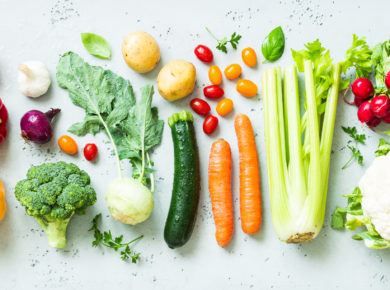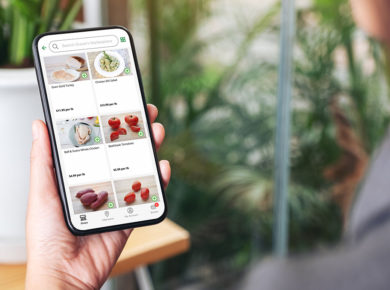Researching insurance options isn’t the most exciting part of being a small business owner. You probably prefer to bring joy to your customers, share something you’re passionate about, and discover or create delicious new produce. However, insurance is an important part of owning a food business. Without it, your store could face serious financial burdens in the event of lawsuits, food spoilage, and extreme weather events.
Why do I need insurance?
Insurance is expensive, but the cost of not having insurance could be much higher. The specific types of insurance coverage you need are based on the individual nature of your business. However, the case for having some sort of policy (or a range of policies) is simple: it could save your business. Even if you own the safest store in the world, with the best-in-the-business security, equipment, and employees, your business can still be at risk of unforeseen incidents.
Insurance can provide your business coverage and protection in the event of something happening that you have no control over, like a break-in or your building being destroyed in a flood. If something happens to your business that you do not have insurance coverage for, you could end up having to pay hundreds of thousands of dollars in repairs. And if you don’t have the hundreds of thousands of dollars you need? You might have to give up your business.
What types of insurance should I get?
Insurance comes in a few different forms. Insurance prices for businesses vary significantly based on so many factors, that use of an approximation or average in this context would simply be misleading. Insurance costs depend on the number of employees, size and location of your store, the nature of the business you provide, years in business, previous business ventures, and more. That is why insurance prices are ever listed on a website/ad, but rather they tell you to call for a quote.
Here are some of the most common ones for independent grocers and small businesses:
Property insurance
Property insurance covers your business’s building(s) and its contents. Property insurance typically covers damage due to fire, wind, snow, theft, and more. Every policy is different, however, and coverage may vary based on your insurance company and your geographic region. Many policies, for example, do not cover damage as a result of flooding or tsunamis and require a separate water damage policy. An open peril policy will cover the damage of anything not specifically excluded in the policy. On the contrary, named peril policies will only cover losses explicitly named in the policy.
Property insurance coverage can fall into two categories: actual cash value coverage and replacement value coverage. Actual cash value coverage can provide enough money for the replacement item minus its present depreciation. Replacement value coverage, however, can cover the cost of repairing or replacing your damaged property with similar quality items.
Example
You own a grocery shop and your shelving unit gets damaged beyond repair in a storm. Thanks to your open peril policy, the storm is a covered situation. The unit cost $1,000 dollars when you bought it and is 5 years old. Your insurance company determines that an average shelving unit has a lifespan of 10 years, and a replacement nowadays would cost $1,250. In an actual cash value coverage policy, you would receive $625 – the replacement cost multiplied by 50% (the remaining useful life the unit had). In a replacement value coverage policy, you would receive $1,250 (the current replacement value of the damaged unit).
General Liability insurance
General liability insurance covers the costs of claims and lawsuits against your business. Liability insurance is very important to have if you have a physical location your customers shop at or if you sell them goods. Most general liability coverage will cover the cost of medical expenses, pain and suffering, legal fees, and any other fees associated with a slip-and-fall case. Liability insurance can also cover expenses in the event that a product purchased from your store injured the customer in any way, or if you (or one of your employees) damages a customer’s property.
Example
An employee slips in a puddle while unloading goods and falls, breaking their hip. Your general liability coverage might cover their medical expenses, time off due to injury, and legal costs associated with the claim, up to the policy limit.
Business Interruption insurance
This type of insurance covers any costs you may incur if your business is forced to shut down due to an unexpected event. Business interruption insurance is often not sold alone, but rather as an add-on to another policy. Because of this, this policy will not pay out unless the interruption itself is covered in the underlying insurance policy. Many business interruption policies are fairly comprehensive and will cover lost profits, fixed costs, temporary locations, taxes, loan payments, and employee payroll. Most of these payout amounts are determined by business financial records, so be sure to hold onto them in the event of an emergency.
Example
You purchase property insurance for your butcher shop and add-on a business interruption policy. Your store is burned down in a fire. Thankfully, the fire is a named peril in your property insurance policy, which means your business interruption insurance will also pay out. While the property insurance will cover the cost of repairs to your shop, the business interruption policy will cover the rent, employee salaries, taxes, temporary location, lost profits, and more until the business is back up and running.
Equipment Breakdown insurance
Equipment breakdown insurance helps to repair broken equipment and can often provide rental units while you wait for the repairs to be completed. Equipment breakdown insurance is also known as boiler and machinery insurance, but don’t be fooled – it can cover modern equipment as well, including cash registers, refrigeration systems, and phone systems. Most policies will cover the expense of damage to the equipment itself, as well as losses resulting from the damaged equipment. Additionally, some policies will cover spoilage of goods due to the broken equipment.
Example
One night, a power surge causes your refrigeration systems to shut down, and you arrive at your store the next morning to find all of your produce has spoiled. Your equipment breakdown policy may cover the cost of repairing the refrigeration system, as well as the cost of rental refrigeration units while you wait for repairs. In some cases, this policy will also provide compensation for all of the spoiled produce due to the equipment failure.
Worker’s Compensation Insurance
Worker’s compensation insurance covers work-related injuries and is required in most states in order to hire an employee. Worker’s compensation insurance will cover the medical expenses in the event of a work-related injury, as well as wages during time off. Additionally, if your employee is injured in a way that is not covered in your worker’s compensation insurance, your policy will likely cover any legal fees associated with the lawsuit. If you employ part-time workers in addition to full-time, be sure your policy covers them as well.
Example
Your cashier is assisting a customer, and a large box falls and breaks their foot. Your worker’s compensation insurance can cover the cost of any necessary medications and surgeries to your cashier’s foot, as well as their wages in the time they are recovering from their injury.
Cybersecurity insurance
Cybersecurity insurance covers data breaches and other related cyber crimes. Conducting business online is the only way to stay competitive in today’s market, but it also increases your risk of being affected by cybercrime. Cybersecurity insurance can cover the cost of notifying customers of a data breach, providing them with any necessary credit monitoring services, and the cost of regaining control of your data, including paying off a ransom. Additionally, some policies will cover the cost of hiring a security professional to increase your system’s safety to prevent future attacks.
Spoilage insurance
Spoilage insurance covers the expenses of replacing spoiled inventory in the event of accidental loss of perishable goods, caused by events such as a power outage or equipment failure (in some cases, your equipment breakdown insurance might cover spoilage, so make sure to ask your insurance provider). Spoilage insurance is typically offered as an add-on to property insurance.
Example
Your refrigeration system breaks one evening, and your equipment breakdown insurance will only cover the machine itself, and not its contents. Spoilage insurance could cover the cost of the spoiled produce, and often the cost of expediting a new order, if necessary.
Product Recall insurance
Product recall insurance covers the risks and expenses associated with product recalls. Think it can’t happen to you? Last year, over 20,000 pounds of produce were recalled. Product recall insurance can cover the cost of informing customers who may have purchased the good, removing the product from your shelves, proper disposal of the good, and purchasing of new replacement goods. With increasing government regulations of food and beverage products, the need for product recall insurance is growing.
Example
You find that the local farm you buy your eggs from has tested positive for cases of salmonella. Your product recall insurance will cover the expense of informing your customers, properly disposing of the contaminated goods, and purchasing a new supply of non-contaminated eggs.
Now what?
Now you know that you need insurance, and might have an idea about which types of coverage would be best for your business. The next step is to perform further research into specific policies and contact insurance agents to receive quotes for your coverage. Be sure to ask the agent if the insurance company offers a grocery store package or a small business package. Often, these packages include most of the policies you’ll need at a discounted rate. Additionally, be sure to read through your entire policy, carefully looking out for any named perils and exclusions.
Is all this insurance jargon throwing you off? Read our helpful post, Insurance Terms You Need to Know!








